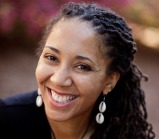
David and Marilyn Knutson Lecture 2014: Dr. Monica Coleman
Rev. Dr. Monica Coleman, “You Can Have it All: Theorizing Transreligious Spirituality from the Field of Black Studies, “Wed., Oct. 22, 2014 at 7:30pm in the Karen Phillips Auditorium.
We are excited to have the Rev. Dr. Monica Coleman deliver the Marilyn and David Knutson lecture Wednesday, October, 22 2014. She is a pastor, scholar and activist and one of the brightest lights in womanist / black theology.
Because of her work with religion and justice, the interdenominational preaching magazine The African American Pulpit named Coleman one of the “Top 20 to Watch” – The New Generation of Leading Clergy: Preachers under 40.
A scholar and activist, Monica A. Coleman is committed to connecting faith and social justice. An ordained elder in the African Methodist Episcopal Church, Coleman has earned the following degrees: A.B. in African American Studies at Harvard University, the Master’s of Divinity degree and Certificate in the Study of Religion, Gender and Sexuality at Vanderbilt University and the M.A. and Ph.D. in Philosophy of Religion and Theology at Claremont Graduate University. Coleman is currently Associate Professor of Constructive Theology and African American Religions and Co-Director of the Center for Process Studies at Claremont School of Theology in southern California. She is also Associate Professor of Religion at Claremont Graduate University. She has had previous academic appointments at Lutheran School of Theology at Chicago and Bennett College for Women.
As a Christian theologian and pastor, Dr. Coleman has written about how liberating theological practices for the black community can include the ancestor spirituality of traditional African religions. Her theological work, demonstrated in works such as Making a Way out of No Way: A Womanist Theology (Fortress, 2008), masterfully combines resources for survival and thriving from many sources: traditional Christian theology, process theology, black and womanist theology, ancestor worship, and social theory.
As a survivor of rape, Coleman became committed to speaking out against sexual violence in 1996. She founded and coordinated “The Dinah Project,” an organized church response to sexual violence, at Metropolitan Interdenominational Church in Nashville, TN. Her expertise in religion and sexual violence has taken her around the country to speak at churches, colleges, seminaries, universities, and regional and national conferences.
Coleman’s writings focus on the role of faith in addressing critical social issues. In her most recent book, Not Alone: Reflections on Faith and Depression, Coleman offers a 40-day devotional wrestling with depression in a spiritual context. Coleman wrote about church responses to sexual violence in The Dinah Project: a Handbook for Congregational Response to Sexual Violence. In Making a Way Out of No Way: a Womanist Theology, Coleman discusses inter-religious responses to the joys and pains of black women’s lives. She is the co-editor of Creating Women’s Theologies: A Movement Engaging Process Thought and editor of the newly released Ain’t I a Womanist Too?: Third Wave Womanist Religious Thought. Coleman’s articles have been featured in a variety of publications including ESSENCE, Journal of Feminist Studies in Religion, Philosophia and Aspire: Women of Color Study Bible.
She blogs on the intersection of faith and depression at http://monicaacoleman.com/blog/ and writes a column, “Women, In Flesh and Spirit” at www.Patheos.com, the website named by Newsweek as “the place to get smarter about religion.” She has been featured as an interviewed guest on NPR, blogtalk radio shows and www.PsychCentral.com. She is a research fellow with the New Media Project that helps religious leaders become theologically savvy about technology. For her willingness to share and serve online, she was listed as 2012’s Top 100 by the Digital Sisterhood Network. She often teaches Bible study in her local church, and speaks widely on religion and sexuality, religious pluralism, churches & social media, mental health, and sexual and domestic violence.



Social Media